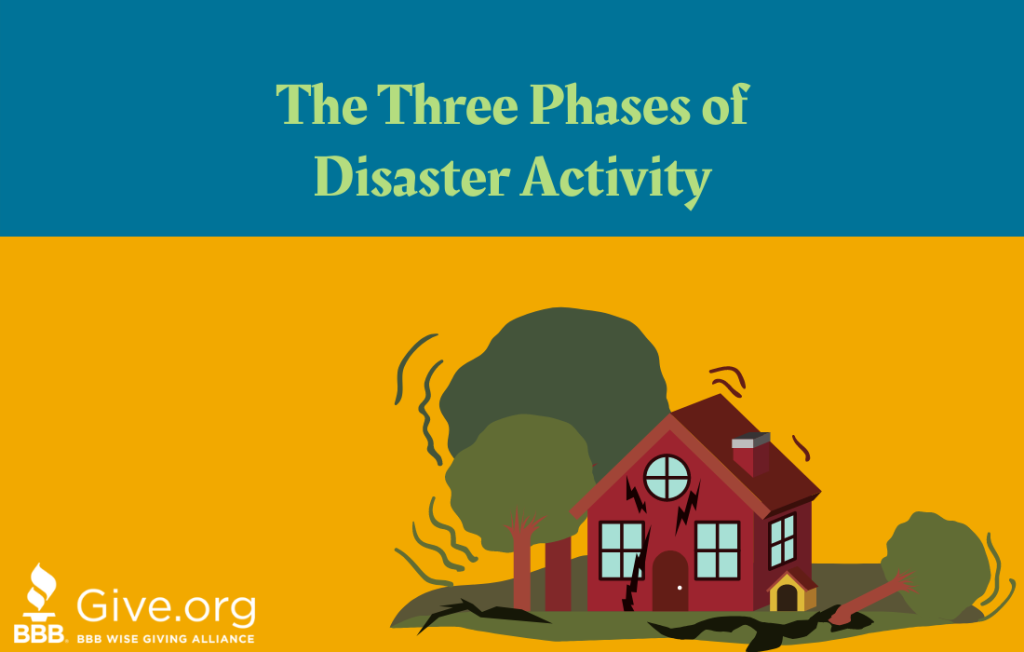Wise Giving Wednesday: The Three Phases of Disaster Activity

Whether it’s the devastating flooding that took place in Middle Tennessee, the next tropical disturbance that threatens to become a hurricane or a tornado that quickly destroys a town, disasters usually run through a shared cycle of activity – the three R’s of disasters: Rescue, Relief and Recovery. Each phase has its own challenges in terms of urgency, timing, fundraising and donor expectations. It would be wise for both charities and donors to be mindful of these circumstances to help ensure that people receive the help they need in order to rebound. As always, BBB Wise Giving Alliance urges donors to check out the trustworthiness of charities addressing disasters by visiting evaluative charity reports on Give.org that specify if the organization meets the 20 BBB Standards for Charity Accountability.
Rescue Phase – This phase of activity takes place immediately after the disaster or tragedy has occurred. It involves first responders such as firefighters, police, trained search teams, medical workers or perhaps the National Guard in the U.S. (or equivalent in another country.) This phase is about saving lives, providing medical help, or finding and moving people out of danger. While there are charities that may be offering services in this area, much of the initial response is likely to be associated with relevant government services. Media also quickly arrive on the scene and provide images of damaged homes, broken roads and people in danger. This is the phase of activity that gets the most emotional response from potential donors. They are moved to do something to help and turn to charitable giving as a means to assist those in need.
Relief Phase – Most of the donation activity is directed to organizations involved with the relief phase which provides shelter, meals, clothing, blankets, water and other essentials for victims and their families. BBB Wise Giving Alliance recommends that contributors seek out charities that have experience in disaster relief activities and already have a presence in the impacted areas. That usually provides the quickest means to deliver aid to as many people as possible. Newly established organizations and/or charities with no disaster experience, may have the best of intentions but will have significant challenges in being able to fulfill promises, particularly for the distribution of needed goods and supplies.
Recovery Phase – The last phase of disaster activity usually takes the longest to accomplish: the recovery phase. This involves community efforts to rebuild after the physical damage has been done. Charities and other organizations will be involved in helping families build homes, schools, houses of worship and repair roads. This phase can take considerable time and huge sums of money. Unfortunately, the fundraising for these operations usually takes place after the headlines have passed and the media cameras are gone. Donors can still be motivated to donate but will need to be reminded of the unfilled needs that must be addressed so a community can truly heal.
The lesson for donors is to remember that there will be many opportunities to help in any disaster situation and not to confine their attention to just the immediate needs that always get the spotlight.
Video of the Week
As part of the Building Trust Video series, we are pleased to provide a video interview with Mariah Smith, Board Member and Development Director, No One Left Behind (a BBB Accredited Charity) works to help America’s wartime allies from Afghanistan and Iraq who are eligible for the Special Immigrant Visa Program to navigate the visa application process and to resettle in the United States once they receive their visa.
Heart of Giving Podcast
This week’s Heart of Giving Podcast features a more detailed interview about the Afghanistan crisis with Mariah Smith, Board Member and Development Director, No One Left Behind.
Recent Reports
We are always working with charities to publish or update reports for donors. Visit Give.org or local BBBs to check out any charity before giving. Our recently evaluated charities include:
Finally, remember to let us know by going to www.give.org/charity-inquiry if you are interested in seeing a report on a charity not on the list and we will do our best to produce one.
H. Art Taylor, President & CEO
BBB Wise Giving Alliance


